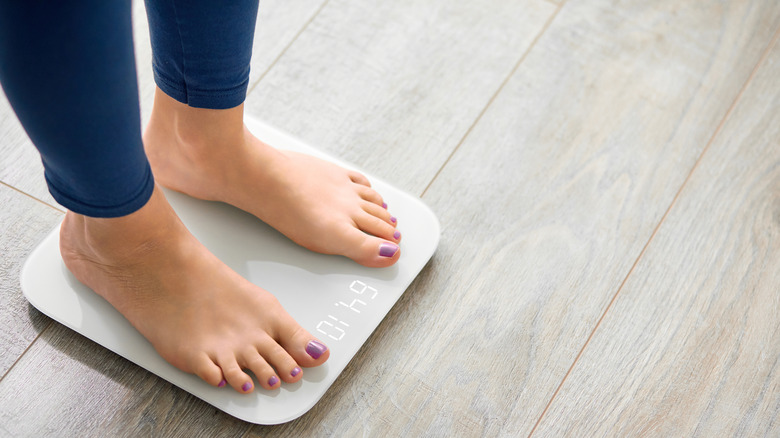The Real Reason You Shouldn't Weigh Yourself Every Day
It is normal for your weight to fluctuate daily depending on the time of the day because of what and when you ate, drank, exercised, or even slept. According to Healthline, an average adult's weight can fluctuate up to 5 or 6 lbs. per day.
Leslie Heinberg, Ph.D., Director of Enterprise Weight Management, told Cleveland Clinic, "The scale is a horrible barometer of behavior change," and added that even if you do everything "right," your weight might fluctuate due to factors like hormones, fluid retention, and even constipation. And, it can be depressing to learn you have put on those extra pounds irrespective of the reasons. Women can experience some weight gain during their period because of hormones, giving in to their cravings, and skipping the gym, and most of the time, the weight goes away 3-5 days after your period, per Women's Health.
Generally, people are disciplined about their diet and workout during the week and tend to splurge over the weekend, and studies show that it can result in your lowest weight on Friday morning and highest on a Sunday night. For those who have a traditional weekend where they tend to eat out more, the study suggests that the most accurate measurement of your weight might be on a Wednesday. Even they don't support weighing yourself daily. All these reasons support the fact that your weight will fluctuate because of reasons out of your control, even if you are super disciplined.
Weighing yourself every day can negatively affect your self-esteem
A person's weight can be a touchy subject, and the pressure around being a certain weight can be incredibly demoralizing for women. CNET says it is a bad idea to weigh yourself every day because it can harm your mental health and self-confidence. Talkspace therapist Kate Rosenblatt told the publication, "It can almost create this false narrative of 'My self-worth is conditional.'" She added that the numbers can equate how "good" or "bad" you are because daily weigh-ins can reinforce an unhealthy sense of control.
Daily weigh-in can create mental obstacles as it can affect your mood and make you obsessive as it can trigger some people. We tend to put a lot of stress on numbers when truthfully, your weight is not the correct representation of your health. Depending on just salt intake, you can weigh different at different times (via Insider). It can be hard to listen to your body's needs if you only think of the numbers.
Meridan Zerner, a dietitian, nutritionist, and wellness coach at Cooper Clinic in Dallas, told American Heart Association that weighing yourself daily can negatively impact your outlook, self-esteem, and positive momentum, making you want to give up and recommends only weighing yourself once or twice a week. But if you find it helpful to self-monitor daily to keep up with your health goals, Zerner suggests, "First thing in the morning is the best," and says to weigh yourself after you go to the bathroom.

